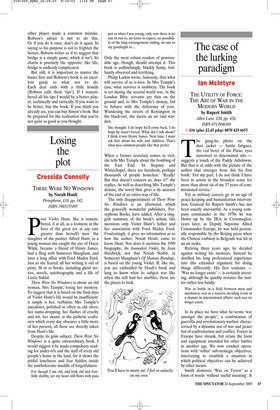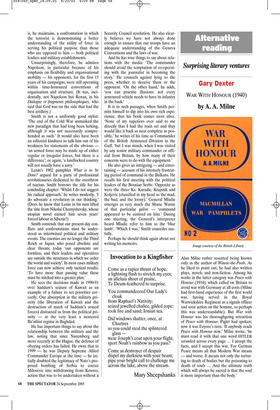The case of the lurking paradigm
Ian McIntyre
THE UTILITY OF FORCE: THE ART OF WAR IN THE MODERN WORLD by Rupert Smith Allen Lane, £20, pp. 428, ISBN 0713998369 ✆ £16 (plus £2.45 p&p) 0870 429 6655 The gung-ho photo on the dust jacket — battle fatigues, the red beret of the Paras, eyes narrowed to determined slits suggests a touch of the Paddy Ashdowns. But that is at odds with the picture of the author that emerges from this his first book: ‘For my part, I do not think I have been in action in the broadest sense for more than about six of my 37 years of commissioned service.’ Yet as military careers go in an age of peace-keeping and humanitarian intervention, General Sir Rupert Smith’s has not been exactly uneventful. As a young company commander in the 1970s he was blown up by the IRA in Crossmaglen; years later, as Deputy Supreme Allied Commander Europe, he was held personally responsible by the Beijing press when the Chinese embassy in Belgrade was hit in an air strike.
Retiring three years ago, he decided against writing his memoirs. Instead he distilled his long professional experience into this extended argument for doing things differently. His first sentence — ‘War no longer exists’ — is certainly arresting, although he quickly restates the matter rather less baldly:
War as battle in a field between men and machinery, war as a massive deciding event in a dispute in international affairs: such war no longer exists.
In its place we have what he terms ‘war amongst the people’, a combination of guerrilla and revolutionary warfare characterised by a dynamic not of war and peace but of confrontation and conflict. Forces in Europe have shrunk, but retain the form and equipment intended for other battles in another age. We now conduct operations with ‘softer’ sub-strategic objectives, intervening to establish a situation in which political objectives can be achieved by other means.
Smith dismisses ‘War on Terror’ as a form of words ‘without useful meaning’. It is, he maintains, a confrontation in which the terrorist is demonstrating a better understanding of the utility of force in serving his political purpose than those who are opposed to him — both political leaders and military establishments.
Unsurprisingly, therefore, he admires Napoleon, in particular because of his emphasis on flexibility and organisational mobility — his opponents, for the first 15 years of his campaigns, were still operating within time-honoured conventions of organisation and structure. (It was, incidentally, not Napoleon but Renan, in his Dialogue et fragments philosophiques, who said that God was on the side that had the best artillery.) Smith is not a uniformly good stylist: ‘The end of the Cold War unmasked the new paradigm that had long been lurking, although it was not necessarily comprehended as such.’ It would also have been an editorial kindness to talk him out of his weakness for statements of the obvious — ‘an armed force may be made up of either regular or irregular forces, but there is a difference’; or again, ‘a landlocked country will not usually have a navy.’ Lenin’s 1902 pamphlet What is to be Done? argued for a party of professional revolutionaries dedicated to the overthrow of tsarism. Smith borrows the title for his concluding chapter: ‘Whilst I do not suggest his radical approach,’ he writes modestly, ‘I do advocate a revolution in our thinking.’ (Does he know that Lenin in his turn lifted the title from Nikolai Chernyshevsky, whose utopian novel earned him seven years’ forced labour in Siberia?) Smith contends that our present-day conflicts and confrontations must be understood as intertwined political and military events. The enemies are no longer the Third Reich or Japan, who posed absolute and clear threats; today ‘our opponents are formless, and their leaders and operatives are outside the structures in which we order the world and society’. In most cases military force can now achieve only tactical results: ‘To have more than passing value these must be stitched into a greater plan.’ He sees the decisions made in 1990-91 over Saddam’s seizure of Kuwait as an example of a failure to set priorities correctly. Our absorption in the military priority (the liberation of Kuwait and the destruction of much of Saddam’s armed forces) distracted us from the political priority — at the very least a neutered Ba’athist regime in Baghdad.
He has important things to say about the relationship between the military and the law, noting that since Nuremberg and more recently at the Hague, the defence of obeying orders has failed. He owns that in 1999 — he was Deputy Supreme Allied Commander Europe at the time — he initially doubted the legitimacy of Nato’s proposed bombing of Serbia to coerce Milosevic into withdrawing from Kosovo, action that was to be undertaken without a Security Council resolution. He also clearly believes we have not always done enough to ensure that our troops have an adequate understanding of the Geneva Conventions and the laws of war.
And he has wise things to say about relations with the media: ‘The commander should avoid the temptation of co-operating with the journalist in becoming the story.’ He counsels against lying to the press, whether to deceive them or the opponent. ‘On the other hand,’ he adds, ‘you can practise illusions: not every armoured vehicle needs to have its infantry in the back.’ It is in such passages, when Smith permits himself to dip into his own rich experience, that his book comes most alive. ‘None of my superiors ever said to me directly that I had the train set and they would like it back as near complete as possible,’ he writes of his time as Commander of the British Armoured Division in the Gulf, ‘but I was struck, when I was visited by any senior military commander or official from Britain, by how many of their concerns were to do with the equipment.’ He also gives an intriguing — and entertaining — account of his intensely frustrating period of command in the Balkans. He recalls his first meeting with the political leaders of the Bosnian Serbs: ‘Opposite us were the three Ks: Karadic, Krajsnik and Koljevic (classified in my head as the mad, the bad, and the loony).’ General Mladic emerges as very much the Shane Warne of that particular galère — ‘command appeared to be centred on him.’ During one meeting, the General’s interpreter heard Mladic refer to him as the ‘blue lamb’. ‘Which I was,’ Smith concedes ruefully.
Perhaps he should think again about not writing his memoirs.

































































 Previous page
Previous page